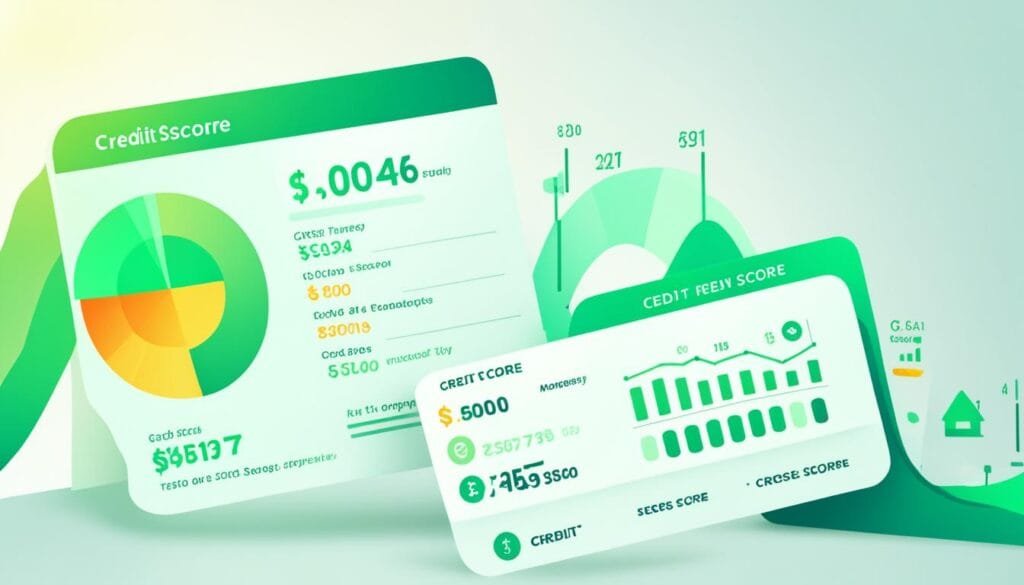Meet Sarah, a hardworking professional who has always paid her bills on time and managed her finances responsibly. Recently, she discovered that her credit score had taken a hit due to a few unexpected medical bills that went unpaid. Sarah was determined to get her credit back on track and improve her financial standing.
Like Sarah, many people find themselves facing the challenge of repairing their credit at home. It can be a daunting task, but with the right knowledge and strategies, you can take control of your credit and boost your score on your own.
Key Takeaways:
- Repairing bad credit is possible with the right strategies and resources.
- Understanding the steps to improve your credit scores is crucial in the DIY credit repair process.
- Rebuilding a credit score takes time and effort, but it is achievable.
- Establishing or building your credit scores requires attention to credit activity and scoring models.
- Empowering yourself with credit education resources can help you make informed decisions and avoid scams.
Steps to Improve Your Credit Scores
One of the key aspects of DIY credit repair is understanding the steps you can take to improve your credit scores. By implementing the following strategies, you can gradually repair your credit and regain financial stability.
- Build your credit file: Start by opening a secured credit card or a credit builder loan. These options allow you to establish a positive payment history and demonstrate responsible credit management.
- Avoid missing payments: Payment history is a vital factor in determining your credit score. Make timely payments on all your accounts to maintain a positive credit history.
- Catch up on past-due accounts: If you have any accounts that are past due, bring them up to date as soon as possible. Late payments can have a significant negative impact on your credit score.
- Pay down revolving account balances: High credit card balances can hurt your credit utilization ratio. Aim to keep your credit utilization below 30% to maximize your credit score improvement.
- Limit new credit applications: Applying for multiple new credit accounts within a short period can raise red flags to lenders and lower your credit score. Only apply for new credit when necessary.
“Improving your credit score requires patience, discipline, and a proactive approach to credit management. By following these steps consistently, you can gradually repair your credit and improve your financial standing.”
Remember, credit repair is a journey, and results may not be immediate. Stick to your plan and monitor your progress regularly to achieve long-term success.
| Pros | Cons |
|---|---|
| 1. Cost-effective | 1. Time-consuming process |
| 2. Empowering | 2. Requires consistent effort |
| 3. Personalized approach | 3. Limited legal expertise |
| 4. Greater financial literacy | 4. No guarantees of success |
How Long Does It Take to Rebuild a Credit Score?
Rebuilding a credit score is a process that requires both time and effort. The timeline for credit score improvement varies depending on several factors. In this section, we will explore these factors and delve into the different scenarios that can influence the time it takes to rebuild your credit score.
The Impact of Missed Payments
One of the key factors that can affect the timeline for credit score improvement is the presence of missed payments. When payments are missed, it can have a negative impact on your credit score. The severity of this impact depends on various factors such as the number of missed payments, how recent they are, and their overall impact on your credit history. By addressing and rectifying missed payments, you can begin the process of rebuilding your credit score.
The Recovery Process After Falling Behind
If you have fallen behind on your payments and are working towards getting back on track, it’s important to understand that the recovery process takes time. As you make consistent, on-time payments and demonstrate responsible financial behavior, your credit score will gradually improve. It’s crucial to maintain this positive behavior over a period of time to see significant progress in rebuilding your credit score.
Effects of Negative Marks Over Time
Negative marks such as delinquencies, collections, or bankruptcy can significantly impact your credit score. While these negative marks may stay on your credit report for a certain period, their impact on your credit score diminishes over time. By consistently practicing good credit behavior and ensuring timely payments, you can mitigate the long-term effects of these negative marks and improve your credit score.
Timeline for Negative Marks to Be Removed
It’s important to note that negative marks may not stay on your credit report indefinitely. The length of time that these negative marks remain on your credit report depends on the type of negative mark and the credit bureau’s reporting guidelines. For example, late payments generally stay on your credit report for up to seven years, while bankruptcies may stay for up to ten years. As these negative marks are removed from your credit report, you will see gradual improvements in your credit score.
Rebuilding your credit score is not an overnight process. It requires patience, diligence, and a consistent approach to responsible financial behavior. By understanding the factors that influence the timeline for credit score improvement and taking proactive steps to address them, you can rebuild your credit and improve your financial well-being.

Continue reading to learn about the process of establishing or building your credit scores. This information will provide valuable insights into creating a strong credit foundation and maximizing your credit potential.
Establishing or Building Your Credit Scores
If you are starting from scratch or have a limited credit history, it’s essential to understand how to establish or build your credit scores. Building credit is crucial for accessing financial opportunities such as getting approved for a loan or credit card, renting an apartment, or even securing employment. In this section, we will explore the requirements for credit scoring models to generate a credit score and discuss the key factors that influence your credit file.
Credit Scoring Models and Credit Files
Credit scoring models, such as FICO Scores and VantageScore, use a range of data from your credit file to calculate your credit score. Your credit file contains information about your credit history, including lines of credit, payment history, and public records. Having a positive credit history is essential for building credit.
One way to start building credit is by opening a credit card or becoming an authorized user on someone else’s card. By using the credit card responsibly and making timely payments, you can establish a positive credit history over time. Another option is to open a secured credit card where you provide a cash deposit as collateral, making it easier to get approved even with no credit history.
Key Factors Influencing Credit Scores
When calculating credit scores, scoring models consider several factors that reflect your creditworthiness:
- Payment History: Paying bills on time and in full demonstrates responsible credit behavior.
- Credit Utilization: Keeping credit card balances low compared to the credit limit shows responsible credit management.
- Average Age of Accounts: Having a longer credit history indicates stability and reliability.

Remember, consistently practicing good credit habits and making responsible financial decisions will help you establish and maintain a positive credit history.
By understanding the key factors that impact your credit scores and taking the necessary steps to build credit, you can work towards achieving a stronger financial foundation. The next section will provide you with valuable credit education resources to further enhance your knowledge and empower you in managing your credit effectively.
Will Following a Credit Score Rehabilitation Program Help Boost My Score Quickly?
If you’re looking to boost your credit score quickly, enrolling in one of the best credit score rehabilitation programs could be a helpful solution. These programs are designed to provide targeted strategies and resources to help individuals improve their creditworthiness and increase their credit score in a timely manner.
Credit Education Resources
To effectively navigate the world of credit repair, it’s crucial to educate yourself about credit and financial management. By enhancing your credit knowledge, you can make informed decisions and take control of your credit. Here are some essential credit education resources to help you get started on your journey to financial well-being:
1. Credit Education Materials: Many credible organizations offer valuable educational resources on credit management. Websites like Experian, Equifax, and TransUnion provide detailed guides, articles, and tutorials to help you understand credit reports, credit scores, and credit repair techniques.
2. Credit Repair Guides: Numerous reputable financial experts and credit bureaus offer comprehensive guides on DIY credit repair. These guides provide step-by-step instructions, actionable tips, and strategies to help you repair your credit effectively and legally.
3. Credit Score Tools: Utilize online tools that allow you to monitor your credit scores and track your progress over time. These tools often come with helpful features, such as credit score simulators, personalized recommendations, and credit monitoring alerts, to assist you in your credit repair journey.
While educating yourself is essential, it’s equally important to be aware of the potential risks associated with credit repair companies and debt settlement services. Ensure that you thoroughly research and vet any company before engaging their services, as there are scams and unethical practices in the industry.
FAQ
What is DIY credit repair?
DIY credit repair refers to the process of improving your credit scores on your own without hiring a professional credit repair company. It involves taking proactive steps to address credit issues and implementing strategies to boost your credit standing.
How can I repair bad credit at home?
Repairing bad credit at home involves several steps. You can start by reviewing your credit reports, identifying errors or negative items, and disputing inaccuracies with the credit bureaus. Additionally, you can work on paying off outstanding debts, making timely payments, and avoiding new credit applications unless necessary.
Can I fix my credit score on my own?
Yes, you can fix your credit score on your own. By following proper credit repair techniques, you can take control of your credit situation and improve your credit scores over time. It requires consistent effort and discipline to achieve positive results.
How can I improve my credit score on my own?
To improve your credit score on your own, you can start by paying all your bills on time, reducing credit card balances, and refraining from opening new accounts unnecessarily. It’s also important to monitor your credit reports regularly and address any errors or negative items.
How do I repair my credit myself?
Repairing your credit yourself involves various steps. You can start by obtaining a copy of your credit report, analyzing it for errors or inaccuracies, and disputing any negative items with the credit bureaus. Additionally, you can work on paying off debts, keeping credit card balances low, and maintaining a consistent payment history.
How long does it take to rebuild a credit score?
The time it takes to rebuild a credit score can vary depending on individual circumstances and the extent of credit damage. Generally, it can take several months to a few years to see significant improvements in your credit score. Consistency in practicing good credit habits is key to expediting the process.
What factors influence the time it takes to rebuild a credit score?
The time it takes to rebuild a credit score can be influenced by factors such as the number of missed payments, the severity of negative marks, and the length of time since the negative incidents occurred. Additionally, consistently making on-time payments, reducing debt, and maintaining a positive credit history can speed up the credit rebuilding process.
How can I establish credit or build my credit scores?
To establish credit or build your credit scores, you can start by opening a secured credit card or becoming an authorized user on someone else’s credit card. It’s also helpful to make timely payments, keep credit card balances low, and maintain a diverse mix of credit accounts.
What factors are considered when calculating credit scores?
When calculating credit scores, factors such as payment history, credit utilization, length of credit history, types of credit used, and recent credit inquiries are taken into account. Each factor carries a different weight in determining credit scores.
Are there resources available to educate myself about credit repair?
Yes, there are various resources available to educate yourself about credit repair. You can find credit education materials, guides, and tools online. It’s important to access reliable sources of information and be cautious of credit repair companies or scams that promise instant results.

